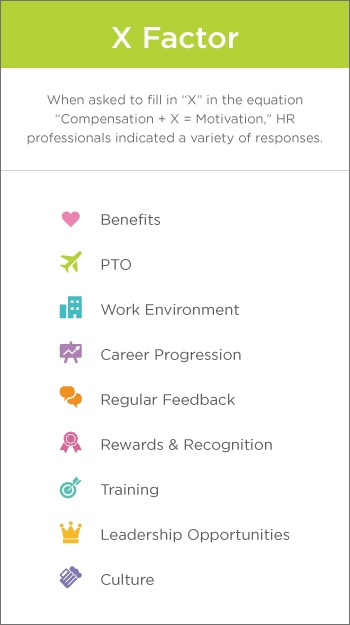The Art of Motivating Employees | Ideas & Techniques



 Cut onboarding time
by 60%—here's the
Ultimate Checklist
that helped do it.
Cut onboarding time
by 60%—here's the
Ultimate Checklist
that helped do it.

A thought-provoking question was posted on LinkedIn recently: “compensation + X = motivation?” From an employee perspective, what is X and how does it impact motivation? Money is a key component but what else contributes? Why is the X factor so important?
As an HR professional, it’s important to have a strategy for motivating employees. But, it seem like that there's an infinite variety of factors that contribute to motivation. Most of us understand employee engagement to be key, as it has tremendous impact on your organization’s ability to compete in the marketplace. If engagement suffers, innovation and creativity will decrease and instead of driving the business forward, it will be lagging behind your strongest competitors. You need your employees to be engaged. So what’s the X factor?
The X Factor
The responses to the LinkedIn post were pretty incredible. The X factor varies from person to person and all are valid:
It is apparent that we all have varying motivational factors and they may change from week to week, depending on how we feel. Money is definitely one part of the equation but the intrinsic variable can shift and is difficult to nail down. I know what you’re thinking—if everyone has a different X factor, how does HR keep engagement running at peak levels? Well, it all depends on you.
Stop the Variable Shift. Communicate.
Many times, we assume what others want. We assume that because we know what motivates us, we’ll know what motivates someone else. However, this is not the case. Instead of assuming, let’s just ask. Communicate with your employees on an individual and regular basis. Find out what motivates them to work hard and feel successful at what they’re doing. Understanding the X factor is your responsibility, as the employer.
You’ll know you’ve found that X factor when you see the following:
• Your HR recruiter works overtime to put the finishing touches on the campus internship program, ensuring that the organization’s brand is front and center and attracts the right talent.
• Innovation and creativity is high. Employees are not afraid to take risks.
• Employee referrals are your main source of recruiting.
• You see increased customer service ratings.
• Turnover is reduced.
The X Factor is a Funny Thing
Yes, it varies from employee to employee. It can be hard to define or solidify. It can change from one day to the next. It can seem illusive. The key to solving the “compensation + X = motivation” equation is communication. Don’t assume you know what works for everyone. Ask. Find out what will make your team more productive, more committed, more loyal.
How did your team solve for X? Tell us about it in the comments.
FAQ's
1. What factors besides salary drive employee motivation?
Ans: Employees are motivated by a combination of intrinsic and extrinsic factors. Beyond pay, recognition, career growth, purpose, work-life balance, and autonomy often play a significant role. Each individual may prioritize these differently, making it essential for HR to understand personal motivators.
2. How can managers identify the X factor for each employee?
Ans: The X factor varies from person to person and can change over time. Managers can identify it through regular one-on-one conversations, engagement surveys, performance feedback, and by observing behavior, such as extra effort on projects, innovation, or advocacy for the company.
3. Why is understanding the X factor critical for engagement?
Ans: High engagement directly impacts productivity, creativity, and retention. When employees feel their unique motivations are acknowledged and supported, they contribute more willingly and innovate without fear, reducing turnover and improving overall organizational performance.
4. Can motivation be sustained without increasing compensation?
Ans: Yes. While fair compensation is foundational, sustaining motivation relies heavily on intrinsic factors. Recognition, growth opportunities, meaningful work, positive team culture, and empowerment often maintain or even increase motivation without additional salary.
5. How can HR create strategies to support diverse motivational factors?
Ans: HR can adopt personalized strategies, such as tailored recognition programs, flexible work policies, mentorship and career development plans, and frequent communication. Continuous feedback loops help adapt strategies as employee motivations evolve over time.

Keep Reading
Best Onboarding Practices for Manufacturing Companies: 15 Proven Tactics That Boost Retention
"Three simple changes to our onboarding process cut our 30-day turnover from 28% to 12%.
Equity in the Workplace: A Practical Guide to Building Fairness and Opportunity
Workplace equity shouldn't be an aspiration—it should be the foundation of how
7 Employee Relations Responsibilities That Transform Workplace Culture
Employee relations shapes how people experience work every single day. It's not just
Like What You Hear?
We'd love to chat with you more about how HR Cloud® can support your business's HR needs. Book Your Free Demo

Build a Culture of Recognition. Boost Engagement. Guaranteed.
Workmates empowers employees to stay informed, connected, and appreciated—whether they’re on the front line, in the office, or remote. Recognition drives 12x higher engagement.Trusted by industry leaders in every sector




Cut Onboarding Costs by 60%.
Take the confusion and follow-ups out of onboarding with automated workflows, digital forms, and structured portals—so new hires ramp faster 3X quicker.Trusted by industry leaders in every sector






